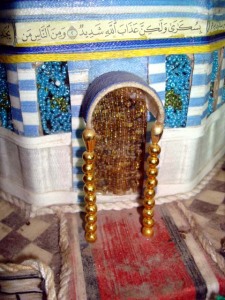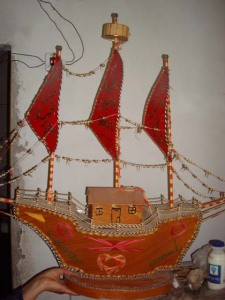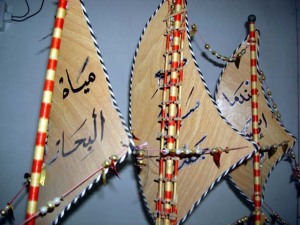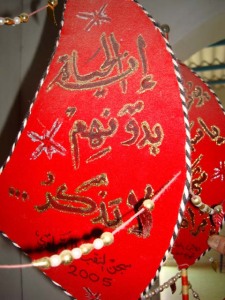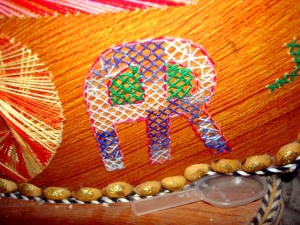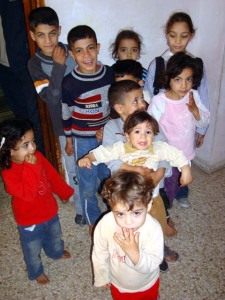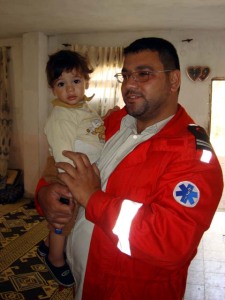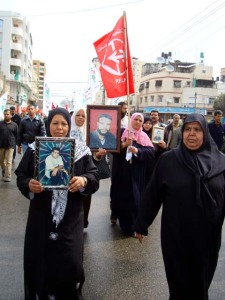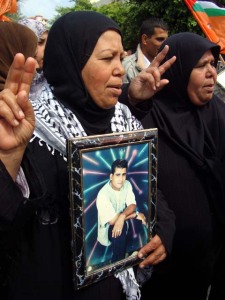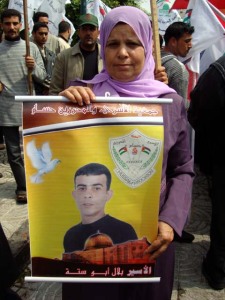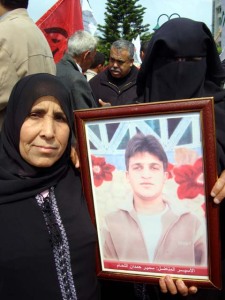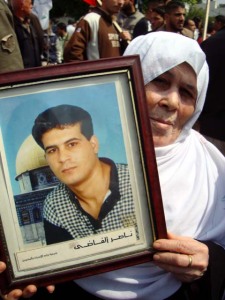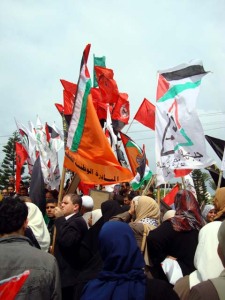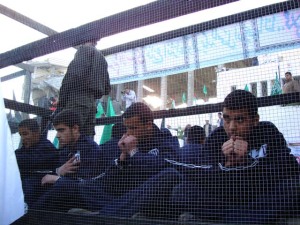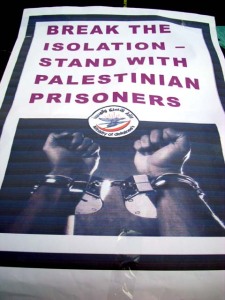
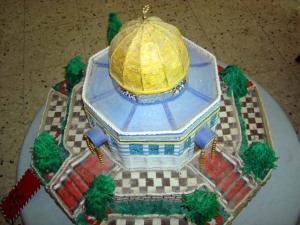
I visited Anwar in his Rafah home last week, 2 days after April 17th Palestinian Political Prisoners’ Day.
Prison is a theme for all Palestinians living in occupied Palestine, whether they themselves have been abducted and imprisoned by Israeli occupation forces, or whether someone in their family (a brother, father, son, daughter, mother) is being held in one of Israel’s prisons.
So while the visit was to meet Anwar’s family, the prison theme was unavoidable.
Anwar spent 3 years in an Israeli prison after taking his then 3 year old son, Yousef, to Egypt for treatment for his cerebral palsy. He, his wife and children ha’d spent 2 months outside of Gaza, but when they returned in June 2004, Anwar was hauled away to Israeli prison for 3 years.
Prior to 2005, Israel still physically occupied Gaza (now Israel occupies Gaza militarily, controlling borders, airspace, water, and even the basic goods allowed into Gaza).
“When we arrived at the border, I was taken aside and questioned. ‘Why were you in Egypt? They accused me of being a weapons merchant.” He was sent to one of Israel’s most notorious prisons, the Nakab prison.
While in prison, he was not only cut off from his 3 children, but also missed out on the birth of his son Ibrahim. “My wife was pregnant with our 4th child then. I didn’t meet him until he was 3 years old.”Despite his unjust confinement and the substandard conditions of his incarceration, prison time eventually afforded Anwar much time for reading and, surprisingly, to develop his artistic side.
His home is filled with crafts made in prison –pillows, embroidery, even a multi-sailed sailboat, all branded with words of love for his wife and children.
“Riham is so strong, I’ve loved her since I was in my mother’s womb,” Anwar said adoringly of his wife, pointing to the embroidered initials ‘AR’–Anwar and Riham–which appear on many of the different crafts he made.
“This is al Khoba al Sakhara, the Dome of the Rock,” he explained, displaying a model of the revered golden dome in the al Aqsa mosque complex in Jerusalem, one of the most important sites for Muslims. Palestinians with Gaza or occupied West Bank ID cards are largely cut off from the holy site, particularly at crucial times, like the religious festivals of Eid. By nature of their West Bank IDs, even during non-holy times of the year, Palestinians outside of Jerusalem (and even those within Jerusalem at times) find it nearly impossible to visit the mosque.
Released three years later, Anwar finally re-aquainted with Riham and their children, including the son he had yet to meet.
Two days prior to visiting Anwar, in Gaza’s demonstration on Palestinian Political Prisoners’ Day I saw a blur of faces — mothers, wives, children–holding posters or small photos of their imprisoned loved ones. In Gaza the situation for political prisoners as well as their families has become unbearable, with visitation rights fully terminated, meaning families have gone one year, five years, or more, without seeing or talking with their imprisoned loved ones.
The Palestinian Centre for Human Rights (PCHR) describes how visitation rights have become worse to impossible after Israel began employing the term “enemy/illegal combattant” in reference to imprisoned Palestinians from Gaza:
Israel began to utilize the contested “illegal combatant” concept with respect to Gazan prisoners. The use of this concept grants the Army Chief of Staff the power to issue an arrest warrant against whoever it considers an “illegal combatant”. Classification criteria is determined by the Army Chief of Staff and the disclosure of evidence is not required.
Palestinian Political Prisoners’ Day honours the nearly 11,000 Palestinians, including 349 minors and 75 women (as of October 2008 ICRC statistics) held in Israeli jails and under the nefarious “administrative detention” category which enables Israel to hold prisoners indefinitely without sentencing them. Israeli rights group B’Tselem says:
Administrative detention is intended to prevent the danger posed to state security by a particular individual. Israel, however, has never defined the criteria for what constitutes “state security.”
Israel’s use of administrative detention blatantly violates these restrictions. Over the years, Israel has held Palestinians in prolonged detention without trying them and without informing them of the suspicions against them. While detainees may appeal the detention, neither they nor their attorneys are allowed to see the evidence. Israel has therefore made a charade out of the entire system of procedural safeguards in both domestic and international law regarding the right to liberty and due process.
As of February 2009, Israel is holding more than 560 Palestinians in administrative detention in facilities run by the Israel Prison Service (IPS).
Recognizing the thousands of unjustly imprisoned Palestinians, in and outside of Palestine, solidarity supporters held demonstrations calling not only for their release but for conditions within Israeli-run prisons to meet the minimum standards internally-recognized for prisoners, something which PCHR succinctly notes Israel consistently falls far short of, listing among many concerns on the treatment of Palestinian prisoners:
• Ill-treatment and poor detention conditions
Palestinian prisoners are detained in below minimum standard conditions. They are detained in narrow, overcrowded and poorly ventilated cells. Israeli jails dedicated for the detention of Palestinians lack necessary sanitation facilities, and Palestinian prisoners are denied access to personal cleanliness and hygiene. Israeli prison administrations do not provide enough food, in terms of quantity and quality, for the Palestinian prisoners. Detained Palestinian children and patients do not get food suitable to ensuring their physical wellbeing.
• denying visitation rights
IOF deny Palestinian prisoners their visitation rights via the imposition of different conditions that hinder or prevent visits of Palestinian families to their relatives in Israeli jails. These conditions include: linking visitations with the overall security situation, requiring that prisoners must not be security prisoners and that persons applying for visits must not have a security record, requiring that visitors be first-degree relatives and that brothers or sons applying for visits must be under the age of 18. Since 6 July 2007, families in Gaza have not been able to visit their relatives in Israeli jails.
• Medical negligence and denial of healthcare
Due to poor detention conditions, hundreds of Palestinian prisoners are suffering ill health. Israeli jails lack specialized medical personnel and clinics. Israeli prison administrations have consistently refused the provision of medicines and medical equipment necessary for the treatment of some sick prisoners. In addition, these administrations ignore the dietary requirements of some detained patients.
• Torture
IOF subject Palestinians detained in Israeli prisons to numerous instances of torture, and cruel, inhuman and degrading treatment. Apart from using poor detention conditions as a means to exert psychological pressure and cause physical weakness, IOF also mistreat Palestinian detainees in order to extract confessions. Known methods include: preventing detainees from meeting with their lawyers, beatings, verbal abuse and insults, threats, the use of Shabhah, sleep deprivation, forcing detainees into the ‘frog crotch’ and the ‘banana’ positions, tightening handcuffs and shackles around hands and legs, suspending by legs, and so on. The isolation of prisoners in poorly-ventilated solitary confinement cells, where they are denied visitation rights and contact with other prisoners, is one of the cruelest punishments applied to Palestinian prisoners. Solitary confinement cells are narrow, poorly ventilated and highly humid; conditions that facilitate the spread of diseases.
IOF violations of Palestinian prisoners’ rights constitute serious violations of International Humanitarian Law. In particular, ill-treatment of prisoners, denial of visitation rights, medical negligence, torture and administrative detentions are violations of the Fourth Geneva Convention of 1949 relative to the protection of civilians in times of war, and against the United Nations Standard Minimum Rules for the Treatment of Prisoners.
useful sites on Palestinian political prisoners:
Sumoud
Addameer
